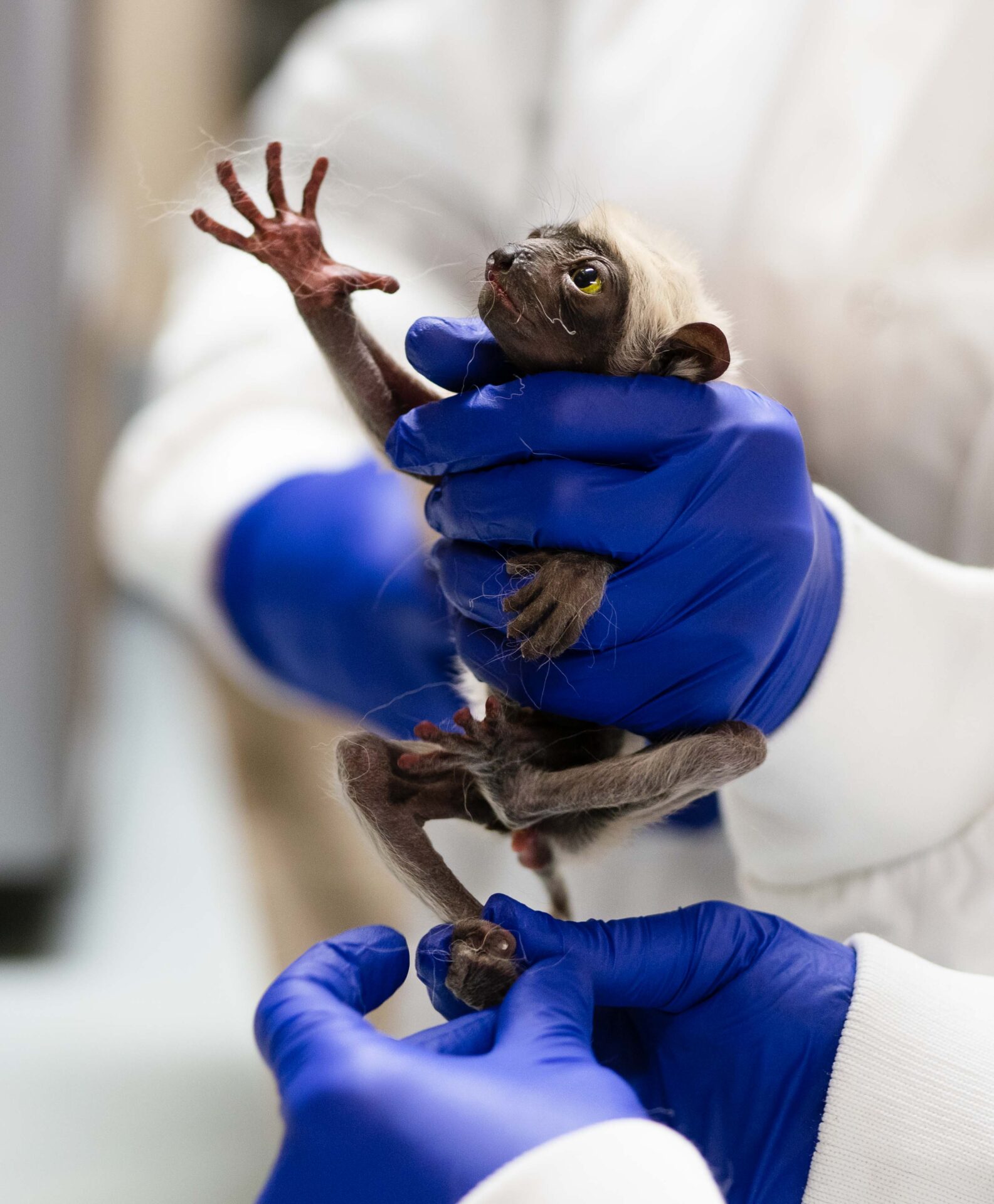
Baby Egeria is handled delicately by the DLC’s veterinary team during her first infant wellness exam on the day of her birth. Photo by Sara Sorraia.
When the Duke Lemur Center’s animal technicians arrived at work on the morning of January 6, 2023, they expected pregnant Coquerel’s sifaka Rodelinda to show up alone for breakfast. Instead, they were greeted with a fuzzy little surprise: the first baby lemur of the new year!
Experienced mom Rodelinda gave birth overnight to a 126g female infant (a healthy weight for a newborn sifaka). Egeria was first described by our veterinary team as “strong, vocal, and beautiful.” This sweet bundle of lemur joy and her parents, Rodelinda and Johann, are now a family of three critically endangered Coquerel’s sifakas here at the DLC.
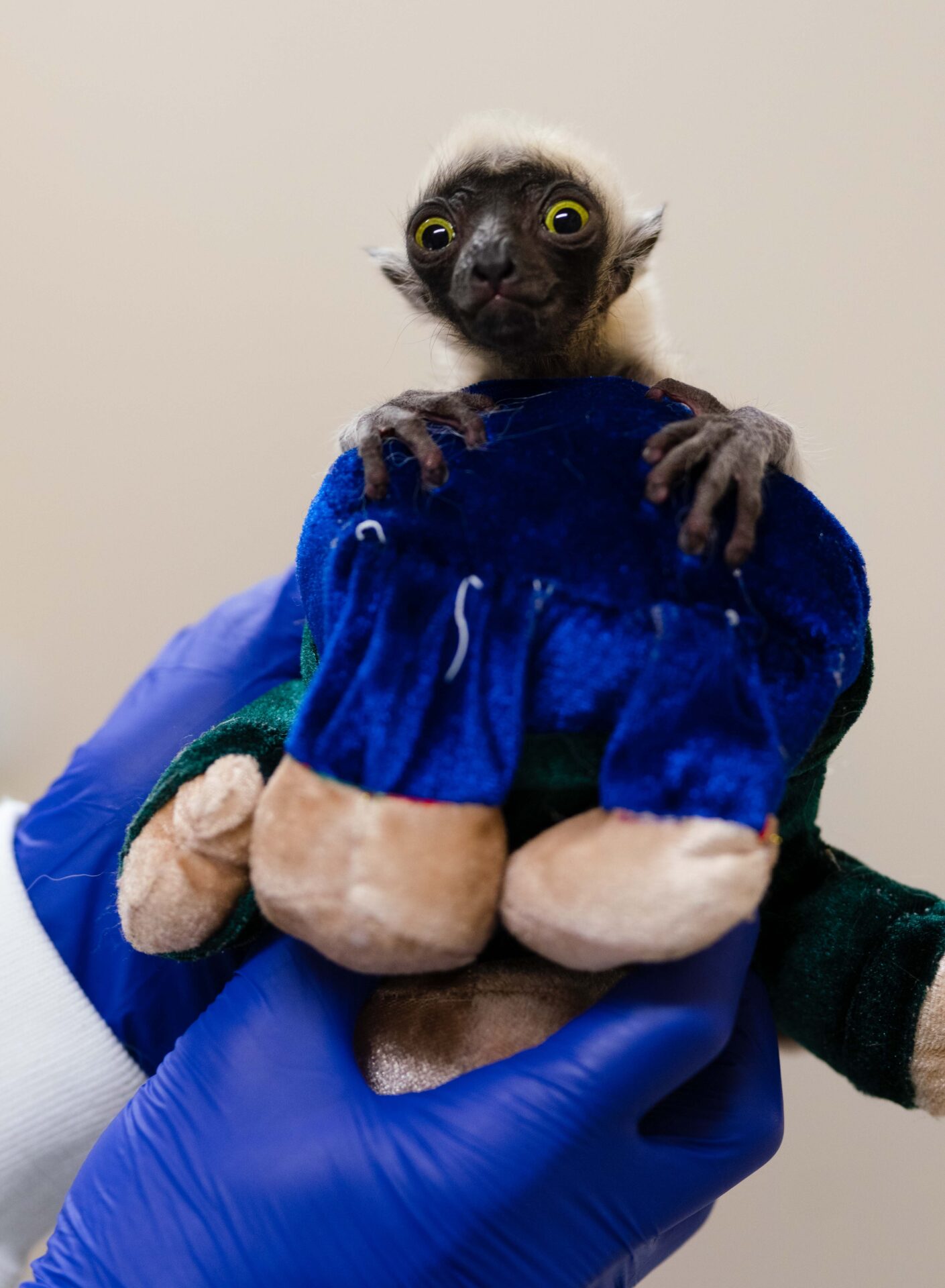
Egeria, clinging to a soft stuffed animal, on the day of her birth. Photo by Sara Sorraia.
Little Egeria isn’t just cute; she’s also a critical part of the Lemur Center’s conservation breeding program and our work maintaining the world’s largest genetic safety net for lemurs, Earth’s most endangered mammals. Egeria and the rest of the colony make it possible for us to learn new things about primate health and behavior through the DLC’s non-invasive research and education programs.
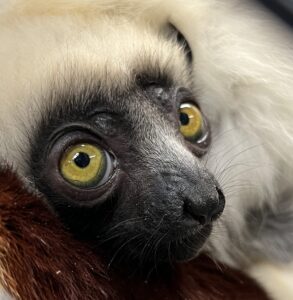
Egeria is the first baby born in 2023 at the Duke Lemur Center! Photo by Natalie Schwob.
What’s in a Name?
How did Egeria get her name? Normally, it is the honor of the technician who cares for the infant’s family to choose the name, which must follow a naming theme that is different for each species at the DLC. Once a short list of name options are chosen and prioritized, the names are reviewed and approved by our registrar and colony curator.
Sometimes, however, the naming rights for a particular infant are given to someone else authorized by the DLC’s director and curatorial team. In Egeria’s case, the naming privilege was offered as an opportunity through the Duke Lemur Center’s annual online auction, and the winning bidder was awarded the naming rights. The generous winning bidders of the auction were the Cooke Family, who are longtime supporters of the DLC’s conservation programs in the SAVA region of Madagascar. Bidding in the auction and ultimately naming the infant was a fun family endeavor.
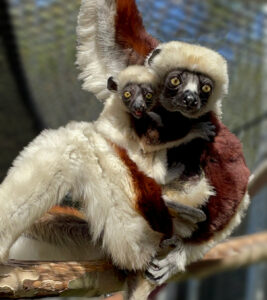
Egeria and mom Rodelinda. Photo by Abby Flyer.
“We had so much fun with this naming challenge,” said Julie Harkness Cooke, whose daughter, Elsa, led the family’s quest to choose the perfect name for the infant. Julie credits Elsa’s high school Latin classes for giving her the context and inspiration needed to find a name within the Coquerel’s sifaka species naming theme: Roman emperors, Roman empresses, and their consorts. Elsa’s top name suggestion was Egeria (pronounced “[EH] +[JEER] + [EE] + [UH]”), the consort of Numa, legendary second king of Rome.
Elsa and her family were particularly intrigued that Egeria was rumored to be a nymph – a mythological spirit of nature imagined as a beautiful maiden inhabiting rivers and woods. A sacred grove and spring dedicated to the nymph and minor goddess still exists in Rome today.
“Egeria’s special connections to nature stood out to us, so we felt the name was a perfect fit for a little lemur,” Julie explained.
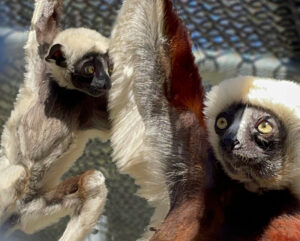
At two months old, Egeria is starting to hang on her own, under mom’s close supervision. Photo by Abby Flyer.
Family Matters
At the DLC, Egeria and her family’s primary caretaker is animal technician Danielle Lynch. Danielle shared that the dad, Johann, is a first-time dad and that he is doing really well thus far at following the cues from Rodelinda. Animal caretakers have frequently caught Rodelinda and Johann singing to one another, which is just as cute as it sounds! They also take turns carrying baby Egeria, though mom seems to prefer having her little girl within arm’s reach.
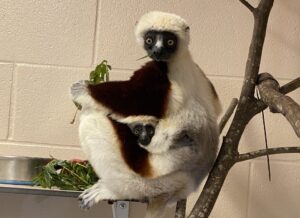
Baby sifakas start out clinging to mom’s stomach, a stage of life affectionately referred to as the “fanny pack stage” by our animal caretakers. Photo by Madison Armand.
Egeria already has developed quite the personality. She has started to explore her environment by chewing on anything she can get between her little teeth: leaves, pieces of her enclosure, and even mom’s fingers! She is also very curious about human visitors and loves to hang her head upside-down to catch a glimpse of new faces. Egeria, Rodelinda, and Johann live in an enclosure that ties to one of the DLC’s largest natural habitat enclosures, so it won’t be long before the whole family will enjoy the outdoors during the warmer months ahead. They will have lots and lots of room to hop, leap, and eat leaves!
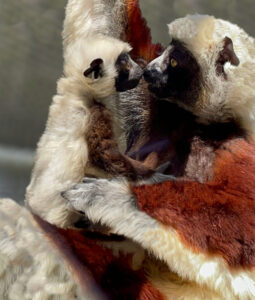
A cute moment between mother and daughter. Photo by Abby Flyer.

